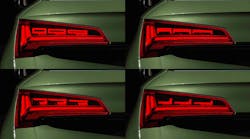Two phosphor-oriented projects, research focused on improving light extraction from GaN LEDs, and OLED manufacturing research comprise the first fiscal year 2015 DOE SSL grants.
The SBIR and STTR program is intended to engage small businesses that have innovative ideas in federal R&D. Indeed, all of the new SSL research projects will explore an innovative concept in the LED or OLED space to determine the feasibility for transfer into a commercial product.
The DOE has a long history of supporting such SSL research projects. In FY14, the agency funded four projects as well, with the participants being VoltServer, Innotec, Mojo Labs, and OLEDWorks. In FY13, the DOE funded four OLED projects.
FY15 SBIR projects
In the FY15 program, PhosphorTech's project is entitled "Plasmonic-enhanced high light extraction phosphor sheets for solid-state lighting." The research will be based on the company's phosphor film technology that could lead to a simpler process in the back-end packaging steps of LED manufacturing. But the SBIR research will specifically focus on the use of high-quantum-yield red phosphors combined with surface plasmon resonance, and techniques to improve light extraction.
Lumisyn's project is entitled "Nanocrystal-based phosphors with enhanced lifetime stability." The company hopes to reduce the degree of oxidation in such phosphors with the oxidation thought to be the basic issue with poor lifetime. By modifying the crystal structure, Lumisyn believes it can both maintain optical qualities while extending the phosphor lifetime.
Triton Systems' SSL research project is entitled "Improved light extraction from GaN LEDs." The company will work with North Dakota State University on a block copolymer system that can be applied in LED manufacturing. The results could be improved performance in LEDs in terms of output and the ability to operate reliably at extended temperatures.
OLEDWorks' research is entitled "Shorting reduction layer process development for OLED lighting panels." The SSL research project is intended to increase the reliability of OLED panels. The company will study how shorts occur in OLED panels and seek to optimize the layer in an OED stack that is grown to reduce such shorts.






